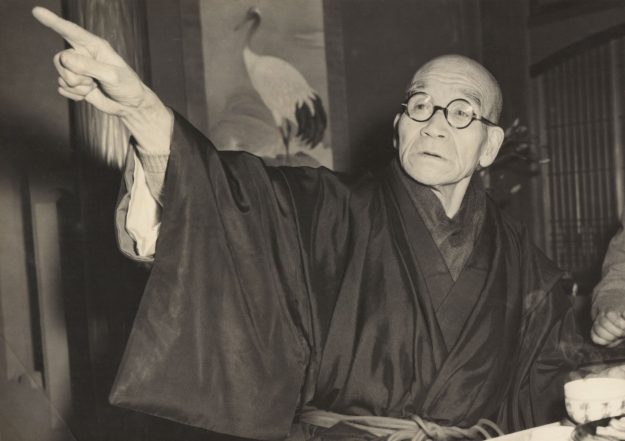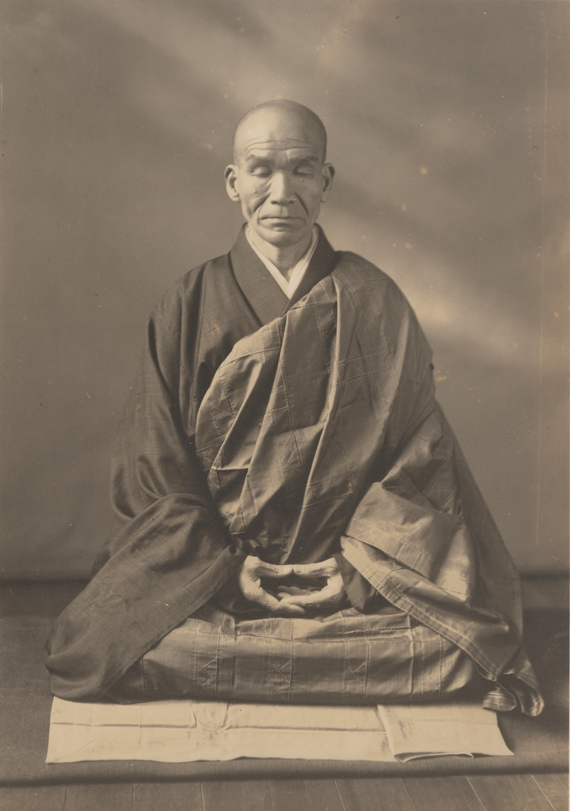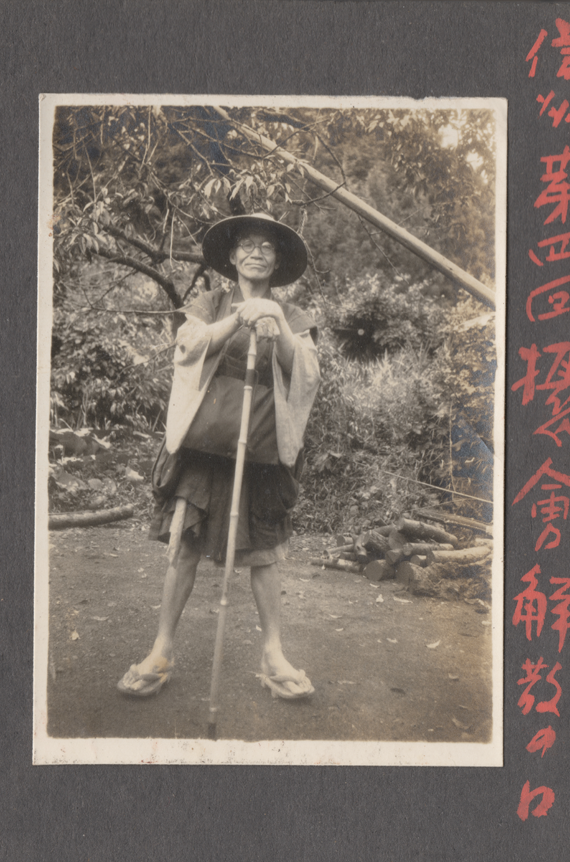Kodo Sawaki Roshi [1880–1965], or “Homeless Kodo,” as he came to be known, was one of the most influential Soto Zen teachers of the 20th century. Born in 1880 and orphaned in early childhood, Sawaki ran away from his caretaker at the age of 16 to become a monk. Not long after he was ordained, he was drafted into the Imperial Japanese Army and served during the Russo-Japanese War of 1904–05. When the war concluded, he returned to his study of Zen, eventually taking responsibility of Antaiji Shichikurin Sanzen Dojo in 1949. Sawaki was by no means a conventional abbot, however, and instead of attending to administrative duties at the temple, he roamed around the country of Japan in order to teach zazen [meditation] to laypeople, an endeavor he dubbed the “Moving Monastery.” His efforts both earned him the appellation “Homeless” and established him as a pioneer of the repopularization of sitting practice within Japan.
What follows is an abridged version of a collection of his sayings, called “To You,” which were compiled by Sawaki’s successor, Uchiyama Roshi. Unpublished in full, a selection can be found on Antaiji’s website, from which this text was taken. It has been translated from the Japanese original by Muho Noelke, the current abbot of Antaiji, and Reiho Haasch, a teacher in the lineage.
Sawaki is especially known for his nomadic lifestyle and for emphasizing the importance of meditation over the study of texts or working with koans. If his words here are any indication, however, he must also be remembered for his charismatic and direct style of communication, which can sometimes border on the irreverent. Are you worried about your career? Fighting with your spouse? Complaining about how busy you are? Homeless Kodo has a piece of advice for you. We just can’t guarantee it’s the advice you’ll want to hear.
1. To you who have just begun brooding over life
In a part of Manchuria, the carts are pulled by huge dogs. The driver hangs a piece of meat in front of the dog’s nose, and the dog runs like crazy to try to get at it. But of course he can’t. He’s only thrown his meat after the cart has finally reached its destination. Then in a single gulp, he swallows it down.
It’s exactly the same with people and their paychecks. Until the end of the month they run after the salary hanging in front of their noses. Once the salary is paid, they gulp it down, and they’re already off: running after the next payday. Nobody can see farther than the end of their nose.
The question is: why are you straining your forehead so much?
If you aren’t careful, you’ll spend your whole life doing nothing besides waiting for your ordinary-person hopes to someday be fulfilled.
2. To you who can’t stop worrying about how others see you
You can’t trade even a single fart with the next guy. Each and every one of us has to live out his own life. Don’t waste time thinking about who’s most talented.
The eyes don’t say, “Sure we’re lower, but we see more.” The eyebrows don’t reply, “Sure we don’t see anything, but we are higher up.”
The nose can’t replace the eyes, and the mouth can’t replace the ears.
Everything has its own identity, which is unsurpassable in the whole universe.
3. To you who are totally exhausted from fighting with your spouse
The question isn’t who’s right. You’re simply seeing things from different points of view.
It all begins when we say “I.” Everything that follows is illusion.
Stop trying to be something special—just be what you are. Hold fire. Just sit!
4. To you who think there’s something to being “in”
You’re always hanging on to others. If somebody’s eating French fries, you want French fries too. If somebody’s sucking on a candy, you want a candy too. If somebody’s blowing on a pennywhistle, you scream, “Mommy, buy me a pennywhistle too!” And that doesn’t just go for children.
When spring comes, you let spring turn your head. When autumn comes, you let autumn turn your head. Everyone is just waiting for something to turn their head. Some even make a living turning heads—they produce advertising.
One at a time people are still bearable, but when they form cliques, they start to get stupid. They fall into group stupidity.
We live in group stupidity and confuse this insanity with true experience. It is essential that you become transparent to yourself and wake up from this madness. Zazen means taking leave of the group and walking on your own two feet.
5. To you whose life is about money, money, and more money
Human happiness and unhappiness doesn’t only depend on money. If the balance in your savings account were a measure of your happiness, it would be a simple matter. Yet it really isn’t so.
Don’t be so helpless that you start saying you need money to live. In this world you can lead a fine life without savings.
Some think they’re important because they have money. Others think they’re important because they have “satori” [enlightenment]. But no matter how much you puff up your personal sack of flesh, you won’t make yourself into any- thing besides a devil.
That which doesn’t belong to you fills the entire universe. Where personal thoughts come to an end is where the buddhadharma begins.
6. To you who would like more money, love, status, and fame
Stupidity means being preoccupied with your own body. Wisdom says, “I am what I am, no matter how things end up.”
Once during the war [the Russo-Japanese War, 1904–05] I visited a coal mine. With the same outfit and headlamp as the miners, I got into the lift and down we went. At one point when we were going down it seemed to me as if suddenly we were going up again. But when I looked with the lamp at the wall of the shaft, I saw that we were still going down. In the beginning when we were accelerating downward, we could really feel that we were going downward. It was only when the velocity changed that it seemed to us as if we were going up again. In exactly the same way, when we think about our lives, we always go wrong when we mistake the fluctuating amounts for the sum.
Losing is satori. Winning is illusion.
Not coveting a single thing is the greatest gift you can give to the universe.

7. To you who would like to leave your rivals in the dust
We often wonder who here is really better. But aren’t we all made out of the same lump of clay?
Everyone should sit firmly anchored in the place where there is no better and worse.
Your whole life you’re completely out of your mind because you think it’s obvious that there is a “you” and “the others.” You put on an act to stand out in a crowd, but in reality there’s neither “you” nor “the others.”
Buddhadharma means seamlessness. What seam runs between you and me? Sooner or later we all end up acting as if a seam separates friend and foe. When we get too used to this, we believe that this seam really exists.
Poor and rich, important and unimportant—none of that exists. It’s only glitter on the waves.
8. To you who are sobbing because somebody’s put one over on you
All beings are mistaken: we see as happiness that which leads to unhappiness, and weep over an unhappiness which isn’t unhappiness at all. We all know the child whose tears suddenly turn into laughter when you give him a cookie. What we living beings call happiness isn’t much more than that.
At some point you’ve got to slap yourself in the face and seriously ask yourself: is your personal gain or loss really worth this overwhelming joy and suffering?
Sooner or later everyone starts thinking of nothing besides themselves. You say, “That was good!” But what was good? It was only good for you personally, that’s all.
A person with big desires is easily fooled. Even the greatest con man can’t profit from a person with no desires.
Buddhism means no self, nothing to gain.
9. To you who are tumbling down the career ladder
When you’re dead and you look back at your life, you’ll see that none of this mattered in the least.
Fortune and misfortune, good and bad—not everything is how it looks to your eyes. It’s not how you think it is either. We’ve got to go beyond fortune and misfortune, good and bad.
Suffering is nothing more than the suffering we create for ourselves.
10. To you who are complaining all the time that you haven’t got any time
Everybody complains that they’re so busy they haven’t got any time. But why are they so busy? It’s only their illusions that keep them busy. A person who practices zazen has time. When you practice zazen, you have more time than anyone else in the world.
If you aren’t careful, you’ll start making a big fuss just to feed yourself. You’re constantly in a hurry, but why? Just to feed yourself. Chickens too are in a hurry when they peck at their food. But why? Only to be eaten by humans.
How many illusions does a person create in their lifetime? It’s impossible to calculate. Day in, day out, “I want this, I want that . . .” Just a single stroll in the park is accompanied by incalculable illusions. So that’s what it means to be “busy.” “I want to be with you, I want to come home, I want to see you. . . .”
People are constantly out of breath— from running so quickly after their illusions.
11. To you who wish you could lead a happier life
Rest awhile and everything will be fine. We simply need to take a short break. Being buddha means taking a short break from being a human. Being buddha doesn’t mean working your way up as a human.
“What sort of person stands on the ground where there’s neither coming nor going?” Kyuho answered, “The stone sheep versus the stone tiger: sooner or later they’ll get tired of staring each other in the eyes.” The stone sheep won’t flinch. The stone tiger won’t jump out of hunger. That’s the point—encountering things beyond thinking.
What do we have when we truly have a grip on things as they are? Beyond-thinking [hishiryo]. Beyond-thinking doesn’t allow itself to be thought. No matter if you think so or not: things are simply as they are.
“All things are empty” means there’s nothing we can run into, because nothing is really happening. Nothing is ever happening, no matter what seems to be going on—that’s the natural condition. Illusion means losing this natural condition. Normally we don’t recognize this natural condition. Normally we cover it with something else, so it’s not natural anymore.
The buddhadharma means the natural condition.
To practice the way of Buddha means to completely live out this present moment—which is our whole life—here and now.

12. To you who want to study a little Buddhism to improve yourself
“Empty theories” is what we call it when bystanders play around with terminology. Playing around like that is good for nothing. Dive in with body and soul!
You’ve got to die completely in order to be able to reflect on the buddhadharma. It isn’t enough to torture yourself and only die halfway.
13. To you who say that Buddhism doesn’t have anything to do with you
When you talk about Buddha, you’re thinking of something far away that’s got nothing to do with you, and that’s why you’re only running around in circles.
Ordinary people and buddhas have the same form. Awakening and illusion have the same form.
When we practice the buddhadharma, we are buddha. Or better yet, it is precisely because we are buddha already that we can practice the buddhadharma.
You believe that Buddhism is a little different from everything else. But it’s not like that at all: Buddhism is each and every thing.
14. To you who are wondering if your zazen has been good for something
What’s zazen good for? Absolutely nothing! This “good for nothing” has got to sink into your flesh and bones until you’re truly practicing what’s good for nothing. Until then, your zazen really is good for nothing.
You say you want to become a better person by doing zazen. Zazen isn’t about learning how to be a person. Zazen is to stop being a person.
You say, “When I do zazen, I get disturbing thoughts!” Foolish! The fact is that it’s only in zazen that you’re aware of your disturbing thoughts at all. When you dance around with your disturbing thoughts, you don’t notice them at all. When a mosquito bites you during zazen, you notice it right away. But when you’re dancing and a flea bites your balls, you don’t notice it at all.
Don’t whine. Don’t stare into space. Just sit!
15. To you who are out of your mind trying so hard to attain peace of mind
You lack peace of mind because you’re running after an idea of total peace of mind. That’s backwards. Be attentive to your mind in each moment, no matter how unpeaceful it might seem to be. Great peace of mind is realized only in the practice within this unpeaceful mind.
When dissatisfaction is finally accepted as dissatisfaction, peace of mind reigns.
16. To you who say that you have attained a better state of mind through zazen
As long as you say zazen is a good thing, something isn’t quite right. Unstained zazen is absolutely nothing special. It isn’t even necessary to be grateful for it. . . . Don’t stain your zazen by saying that you’ve progressed, feel better, or have become more confident through zazen.
We only say, “Things are going well!” when they’re going our way.
We should simply leave the water of our original nature as it is. But instead we are constantly mucking about with our hands to find out how cold or warm it is. That’s why it gets cloudy.
Zazen isn’t like a thermometer where the temperature slowly rises: “Just a little more . . . yeah . . . that’s it! Now I’ve got satori!” Zazen never becomes anything special, no matter how long you practice. If it becomes something special, you must have a screw loose somewhere.
17. To you who are aiming at the ultimate way of life
What’s the buddhadharma about? It’s about having every aspect of your daily life pulled by Buddha.
The basis of all actions is to follow through to the end. If your mind is absent even just for a moment, you’re no different from a corpse. Practice means asking with your whole being the question “What can I do right now for the Buddha way?”
It isn’t enough to hit the bull’s-eye once. Last year’s perfect marks are useless. You’ve got to hit the bull’s-eye right now.
♦
Translated from the Japanese original by Muho Noelke and Reiho Haasch and reprinted with their permission.
Thank you for subscribing to Tricycle! As a nonprofit, we depend on readers like you to keep Buddhist teachings and practices widely available.
